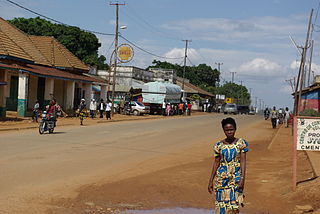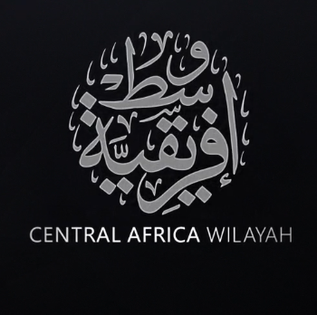
The Allied Democratic Forces is an Islamist rebel group in Uganda and the Democratic Republic of the Congo (DRC). It considered a terrorist organisation by the Ugandan government and the United States. It was originally based in western Uganda but has expanded into the neighbouring DRC. Most Ugandan ADF fighters are Muslims from the Baganda and Basoga ethnic groups.

Bundibugyo District is a district in the Western Region of Uganda, bordering the Democratic Republic of the Congo (DRC). The town of Bundibugyo is where both the district headquarters and the Bwamba Kingdom seat are located. Before July 2010, the districts of Ntoroko and Bundibugyo were one. These districts are the only two in Uganda that lie west of the Rwenzori mountains. Bundibugyo was first named Semuliki district on separating it from the Greator Kabarole district alongside Rwenzori district (Kasese) in 1974.

The Kivu conflict is an umbrella term for a series of protracted armed conflicts in the North Kivu and South Kivu provinces in the eastern Democratic Republic of the Congo which have occurred since the end of the Second Congo War. Including neighboring Ituri province, there are more than 120 different armed groups active in the eastern Democratic Republic of Congo. Currently, some of the most active rebel groups include the Allied Democratic Forces, the Cooperative for the Development of the Congo, the March 23 Movement, and many local Mai Mai militias. In addition to rebel groups and the governmental FARDC troops, a number of national and international organizations have intervened militarily in the conflict, including the United Nations force known as MONUSCO, and an East African Community regional force.

The Allied Democratic Forces insurgency is an ongoing conflict waged by the Allied Democratic Forces in Uganda and the Democratic Republic of the Congo, against the governments of those two countries and the MONUSCO. The insurgency began in 1996, intensifying in 2013, resulting in hundreds of deaths. The ADF is known to currently control a number of hidden camps which are home to about 2,000 people; in these camps, the ADF operates as a proto-state with "an internal security service, a prison, health clinics, and an orphanage" as well as schools for boys and girls.

Lubero is a town in the North Kivu Province of the Democratic Republic of the Congo. It is the administrative center of the Lubero Territory. Following the surrender of the Mai-Mai fighters in 2021, construction of a new market began in 2022, involving the mayor, ex-soldiers, "young people at risk and the vulnerable women". As of March 2014, the population of Lubero is not publicly known.

On 14 August 2016, multiple assailants raided the district of Rwangoma in the city of Beni which is located in North Kivu of the Democratic Republic of Congo (DRC). The city is located in the popular Virunga National Park. At least 64 people were killed, as 64 bodies had been located during the search. Officials estimate the death toll to be from 75 to 101. An unknown number of people were injured. The Ugandan rebel group Allied Democratic Forces (ADF) were suspected to be behind to attack by the DRC. The incident is another in a series of massacres in Beni that have left over 700 people dead since October 2014.

The 2017 Semuliki attack was an attack carried out by elements of the Allied Democratic Forces on a United Nations Organization Stabilization Mission in the Democratic Republic of the Congo (MONUSCO) operating base in the Beni Territory, North Kivu region of the Democratic Republic of the Congo on December 7, 2017. The attack was highly coordinated and resulted in the deaths of fifteen U.N. peacekeeping personnel and wounds to 53 others making it the deadliest incident for the U.N. since the deaths of twenty-four Pakistani peacekeepers in an ambush in Somalia in 1993. The attack was among many of the latest flare-ups in violence in the North Kivu region which borders Uganda and Rwanda and one of the ADF's deadliest attacks in recent history. U.N. Secretary-General António Guterres labeled the attack, "the worst attack on UN peacekeepers in the organization's recent history."
Jamil Mukulu is a Ugandan militant leader and suspected war criminal who was the principal founder and former leader of the Allied Democratic Forces, an armed Islamist rebel group in Uganda and the Democratic Republic of the Congo. Mukulu was arrested in Tanzania in 2015 and is currently awaiting trial in Uganda for charges such as murder and crimes against humanity.
Musa Seka Baluku is a Ugandan militant, terrorist and leader of the Allied Democratic Forces, a rebel insurgent group in Uganda and the Democratic Republic of the Congo, now largely a part of Islamic State – Central Africa Province. He took over as the commander of the ADF following the 2015 arrest of its former leader, Jamil Mukulu, in Tanzania.

The Islamic State – Central Africa Province is an administrative division of the Islamic State (IS), a Salafi jihadist militant group and unrecognised quasi-state. As a result of a lack of information, the foundation date and territorial extent of the Central Africa Province are difficult to gauge, while the military strength and activities of the province's affiliates are disputed. The Central Africa Province initially covered all IS activities in the Democratic Republic of the Congo, Mozambique and Uganda. In September 2020, during the insurgency in Cabo Delgado, IS-CAP shifted its strategy from raiding to actually occupying territory, and declared the Mozambican town of Mocímboa da Praia its capital. After this point, however, the Mozambican branch declined and was split off from IS-CAP in 2022, becoming a separate IS province; as a result, this leaves IS-CAP to operate in the Democratic Republic of the Congo and Uganda.
The 2020 Democratic Republic of the Congo attacks were a series of attacks which took place in 2020. The attacks were mostly carried out by the Allied Democratic Forces (ADF), a radical Islamist rebel group and the Cooperative for the Development of Congo (CODECO), an agricultural and religious group made up of ethnic Lendu people. The attacks left at least 1,316 people dead and 132 injured.
On the night on June 5, 2022, militants from Allied Democratic Forces (ADF) attacked the village of Bwanasura, in Otomabere, North Kivu, in the Democratic Republic of the Congo. The attack killed over twenty civilians, marking one of the deadliest attacks by the ADF in 2022.
During 8–9 March 2023, the Allied Democratic Forces (ADF) carried out a massacre in the village of Mukondi in North Kivu in the Democratic Republic of the Congo.
Between August 25 and 30, 2022, fighters of the Allied Democratic Forces attacked six villages in North Kivu, Democratic Republic of the Congo, killing over fifty-four people.
Between the night of April 3–4, 2022, Allied Democratic Forces jihadists attacked the village of Masambo, North Kivu, Democratic Republic of the Congo, killing 21 people.
Events of the year 2024 in the Democratic Republic of the Congo.
Operation Shujaa is an ongoing military offensive conducted by the Democratic Republic of the Congo and Uganda against insurgent forces in Kivu and Ituri, mainly Islamic State (IS) affiliates and the Allied Democratic Forces (ADF). Launched in November 2021, it has resulted in significant losses for the targeted rebel forces and substantially reduced their activity. At times, the government forces engaged in Operation Shujaa have also fought non-ADF/IS rebel groups.
On December 31, 2020, jihadist militants from the Islamic State affiliate Allied Democratic Forces attacked the village of Tingwe, North Kivu, Democratic Republic of the Congo, killing at least thirty people. Several other civilians were kidnapped as well.
On January 4, 2021, jihadists from the Allied Democratic Forces attacked the village of Mwenda, North Kivu, Democratic Republic of the Congo, killing 23 people. The massacre came several days after an attack on Tingwe that killed over 30 people.
On March 12, 2023, jihadists from the Allied Democratic Forces attacked the village of Kirindera, Beni Territory, North Kivu, Democratic Republic of the Congo, killing nineteen civilians. The massacre occurred days after the Mukondi massacre, where the ADF/ISCAP killed around forty civilians,







